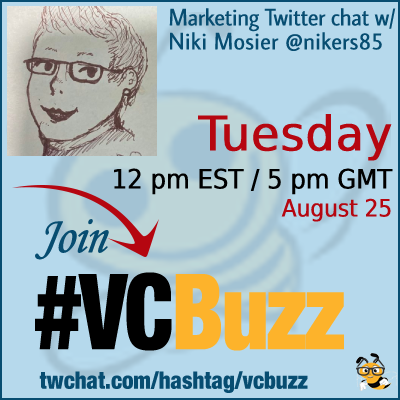
Competitive analysis is something just about any SEO strategy should include.
It is not so much about simulating whatever your – possibly more successful – competitors are doing.
It is about knowing your niche, understanding your audience and broadening your horizons.
How to do SEO competitive analysis properly?
***Add #VCBuzz chats to your calendar here.
***Please sign in here to follow the chat -> twchat.com/hashtag/vcbuzz
About @nikers85
Niki Mosier @nikers85 has been doing SEO for 10 years. Freelancing and working at the agency level has exposed Niki to a variety of clients across many verticals.
She currently works full time @TwoOctobers* as a senior SEO Account Manager and the SEO Practice Lead.
Questions we discussed
Q1 How did you become a digital marketer? Please share your career story!
I got my start as a digital marketer about 12 years ago when I was customizing WordPress websites for small businesses. People would get their website from me and wonder how to get people to find their website. Which led me down the path of SEO.
A1. Finished 4 years getting a Biomedical engineering degree. Pursued my masters in the same at Georgia Tech. Dropped out because that just wasn't for me. Found me a couple good mentors @upsidedakshin and @WanderlustGirl_ and here I am. #VCbuzz
— Kedar Rao (@KeedaKaRao) August 25, 2020
Q2 What are the goals behind an SEO competitive analysis?
As the SEO practice lead @TwoOctobers I’m responsible for leading our team of SEO’s, keeping the team updated on industry trends, creating processes, etc.
For me the goal of competitive analysis is typically to help uncover additional opportunities for a client that we might not have otherwise thought about. It’s also helpful for staying on top in search if you can have a leg up on the competitor.
Another thing that can be beneficial about competitive analysis, is using to help make a case to get work implemented. If a client is hesitant to implement something like Schema for example.
Being able to say competitor x is doing this and it’s getting this result, can be good leverage to get them implement something that is being recommended.
I'd add that when doing an SEO competitive analysis, you will likely discover how you've had tunnel vision. We all fall into ruts and miss the bigger picture. A competitive analysis shows us things we should be focusing on, but aren't. #vcbuzz https://t.co/iPMovYX6Sp
— Anita Campbell (@anitacampbell) August 25, 2020
That’s a great point, I like that!
Q3 What should a good competitive analysis include?
I think good competitive analysis should include what keywords the competitor is ranking for, what SERP features they have (FAQ, review stars, etc), are they using schema, what does their backlink profile look like?
It is not necessary (meaning the site is not broken without it) but can give you a competitive edge in SERPs, hence recommended #vcbuzz
— Ann Smarty (@seosmarty) August 25, 2020
I also like to look at technical factors like page speed and how may URLs they have indexed as well.
A3. Identify the competing brands strengths and weaknesses, observe their every move, content piece, gather as many insights as you can and perhaps even interact with them behind the scenes. Never know what you'll learn. #VCbuzz
— Kedar Rao (@KeedaKaRao) August 25, 2020
For a competitive analysis, I like seeing several competitors side by side showing the general topic areas they rank for. It gives you more of a big picture view. Sites A and B may do well with certain topics, but sites C and D with other topics. Broader picture. #vcbuzz https://t.co/4esQQhwsBI
— Anita Campbell (@anitacampbell) August 25, 2020
Good competitive analysis includes where the competitors are ranked
— Bhargav (@bhargavsh91) August 25, 2020
– how active they are on social media
– there content and placement of keywords
– Technical Seo#vcbuzz
Q4 What are your favorite competitive analysis tools?
I love using SEMRush and ahrefs are great for getting insights into traffic and backlinks for a competitors site. ScreamingFrog is also really helpful for getting a technical view into a site.
I discovered this tool recently that lets you get Core Web Vitals data for multiple sites in one Google Sheet.
Good question. SEMRush for keyword and big picture analysis. At the detailed page level, I love tools like SurferSEO and PageOptimizer Pro which compare on page content. They can point out "holes" in your articles that you need to fill, for readers. What do others use? #vcbuzz https://t.co/SwkTlYsrw7
— Anita Campbell (@anitacampbell) August 25, 2020
If you’re working on a local SEO project, paying spending time in a tool like MobileMoxie or Local Falcon with competitor information can be really insightful as well.
@anitacampbell Keysearch has a feature that allows you to look at a page content in a lot of detail to include a total word count as well as actual words used on the top 10 results. #vcbuzz
— Alvern Bullard (@successunscramb) August 25, 2020
Q5 What are the next steps? How to turn those insights into action?
Putting the insights you’ve found into action by priority is a great next step. What could make the biggest impact first and going from there. Ex: implementing FAQ schema would be a good idea first because it could result in more SERP real estate and better CTR
A5. Use the right keywords. Understand how to get a hold of your users or the consumers of the brand you're servicing. Make sure you're solving a problem for the brand your service. #VCbuzz
— Kedar Rao (@KeedaKaRao) August 25, 2020
Another #SEO Competitive analysis tip…drop a competitor site into a site like the WayBack Machine to see if a competitor has made any big website changes recently. Can be an indication of competitor starting an SEO project potentially.
@nikers85 I implemented a FAQ on a blog post in June last year and I was surprised to see it show up in the SERP. That stuff really works. #vcbuzz
— Alvern Bullard (@successunscramb) August 25, 2020
Our previous SEO chats:
- How to Recover After Losing Rankings in Google’s Core Algorithm Updates with @WilliamAlvarez
- Enterprise SEO Process and Strategy with Jordan Silton @jsilton
- How to Win Against Biggest Brands in SEO with @HamletBatista
- SEO Entities and Google’s NLP with @KrystianSzastok
- How to Claim and Optimize Your Personal Google Knowledge Graph with Don Sturgill @DonSturgill
- How to Monitor Your Rankings with @MordyOberstein of @rankranger
- Schema for Content Marketers with Martha van Berkel with @marthavanberkel
- SEO Ranking Factors with Paul Baguley @BaguleyPaul
- How SEO Has Changed with Deborah Norton @BRAVOMedia1
- SEO Then and SEO Now with Bonnie Burns @Burnsie_SEO



